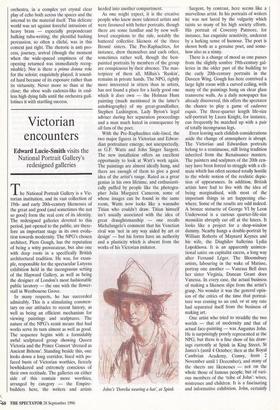Music
Total contrasts
Robin Holloway
Imust turn aside from the riches of an exceptionally diverse Proms season to com- plete the promise of reviewing only its new symphonies and concertos. There were two more of each. The 3rd symphony by the 36- year-old German Detlev Glanert (a BBC commission, 25 August) makes a neat com- parison with the 1st by the 43-year-old Englishman, Anthony Powers (9 Septem- ber).
Glanert despite five movements was compact. Their titles — Landscape at Dun- sinane, Sails and Horizons, Face to Face, Drinking Song, Depraved Heaven — suggest a latent narrative, teasingly withheld. The music is elegant, lucid, expert, in an easy- going eclectic style that often softens into near-allusion — for instance the Berg of Der Wein for the tipsy music, and, less apt, more than a thimbleful of Ives (surely Ives was teetotal?). The gurgling fade-out from raucous drinking song into the woozy dreams and tender fantasies of depravity a graceful oboe melody surrounded by floc- culent chords over a tick-tock ostinato bass — provided the most memorable passages in a work that sounds pleasantly as though written during a compositional siesta.
Whereas the Powers is all-stops-out. One has to admire the ambition here to take on the entire late-Romantic symphonic appa- ratus — four movements, lasting 40 min- utes, a large orchestra including no less than 34 percussion instruments (on four executants) — a detail I can supply because the publishers were kind enough to send a score. And unwise: for following it reveals an amount of over-composed quasi-detail that Woks good on paper but goes for noth- ing in performance. The contrast with the cute accuracy of Glanert is total, where
every movement is exactly in focus musical- ly (even when depicting tipsiness) in a con- text of almost provocative slightness. In Powers's big statement the sonorous spec- trum is often off-focus, with a sort of non- descript rent-a-texture out of Henze and the later Tippett. But not always. Unusual- ly, in this or any other contemporary style, fast music is both copious and convincing. Rarer still, the finale that must clinch what's gone before is by far the best move- ment. In every sense; for it really does, after a slow preparatory start already clear- er and more characterised than anything in the first three movements, begin to move. It's a sort of tarantella with a cool MJQ episode (piano, bass; vibes and sax) and another marked 'light, airy' (which one could hear without the score), leading to a Brahms IIVStravinsky in C apotheosis, slow again, setting a dark beneath a luminous shimmer above; followed, unlike the proto- types, by a brief fast noisy conclusion that, possibly, undoes the effect of haven gained. The two new concertos were more strict- ly comparable in that many technical words — like modal, acoustical, spatial — could be properly used to describe both. But their effect was completely different. The one for piano (Peter Donohoe) plus winds and percussion by Keith Volans (a BBC commission, 22 August) was in its compos- er's words 'all foreground ... in your face .. no more Mister Nice Guy'. It came as a single half-hour workout on modal pat- terns, metallic and pugnacious almost with- out respite. Bracing at first, such unvaried energy soon palled. The models were too plain — Stravinsky and Messiaen, coars- ened by minimalism and obviousness. It certainly kept up, but the cost — the aggressive didactic finger pointing out the mechanics — was too high. 'The only sub- ject of music and art that interests me is freedom ... and complex forms arise on the edge of chaos,' said Volans in the inter- val talk. But as always when this stale old rhetoric spouts, what one chiefly hears is the clank of chains that fetter him.
While in John Woolrich's concerto for oboe (Nicholas Daniel; a BBC commission, 14 August) freedom and space are the principal contents. Melody and rhythm are pared to the bone, there is virtually no har- mony and absolutely no counterpoint. Woolrich like his master Birtwistle is either extremely primitive or extremely refined, and the middle ground where most music happens is unoccupied. Such leanness can on a bad day with this composer be exigu- ous. On a good, as here, it is his positive, defining essence. Especially successful from the very first second was the creation of an acoustic ambience around the sound, using the Albert Hall's notorious cavernousness to build within it, with minimum means, a wide compass from deepest drum to high- est haze of violins. Inside this space the solo oboe drooped, dangled, frisked and keened, now alone, now with his comrades — other oboes, other woodwinds — in the orchestra, in a complex yet crystal clear play of echo both across the spaces and the internal to the material itself. This delicate world was set against forceful intrusions of heavy brass — especially preponderant hulking tuba-writing; the plentiful bashing percussion, so often a cliche, was in this context just right. The rhetoric is anti pro- cess, journey, arrival (though the moment when the wide-spaced emptiness of the opening returned was immediately recog- nisable). Nor is there a prima donna role for the soloist; exquisitely played, it sound- ed hard because of its exposure rather than its virtuosity. Never more so than at the close; the oboe wails cadenza-like in end- less high dying falls until the orchestra guil- lotines it with startling success.



















































































 Previous page
Previous page